Hope and Speculative Anthropology: A Detailed Book Analysis Essay
VerifiedAdded on 2023/03/21
|15
|4113
|40
Essay
AI Summary
This essay presents a comparative analysis of three books: 'The Method of Hope' by Hirokazu Miyazaki, 'Magic’s Reason' by Graham M Jones, and 'Into the Extreme' by Valerie Olson, focusing on the themes of hope and speculative anthropology. The analysis of Miyazaki's work highlights the Suvavou people's struggle for justice and cultural identity in Fiji, showcasing their relentless pursuit of truth and the deconstruction of a monolithic Fijian national identity. Robertson's book explores the integration of humanoid robots in Japanese society, questioning the reinforcement of traditional values and the redefinition of human identity. Olson's 'Into the Extreme' examines the United States' ambition to dominate outer space, reflecting on its technological and military implications. The essay explores how each book, through its unique lens, contributes to the broader understanding of hope, future aspirations, and the speculative nature of anthropological inquiry, all of which are available for further exploration on Desklib.
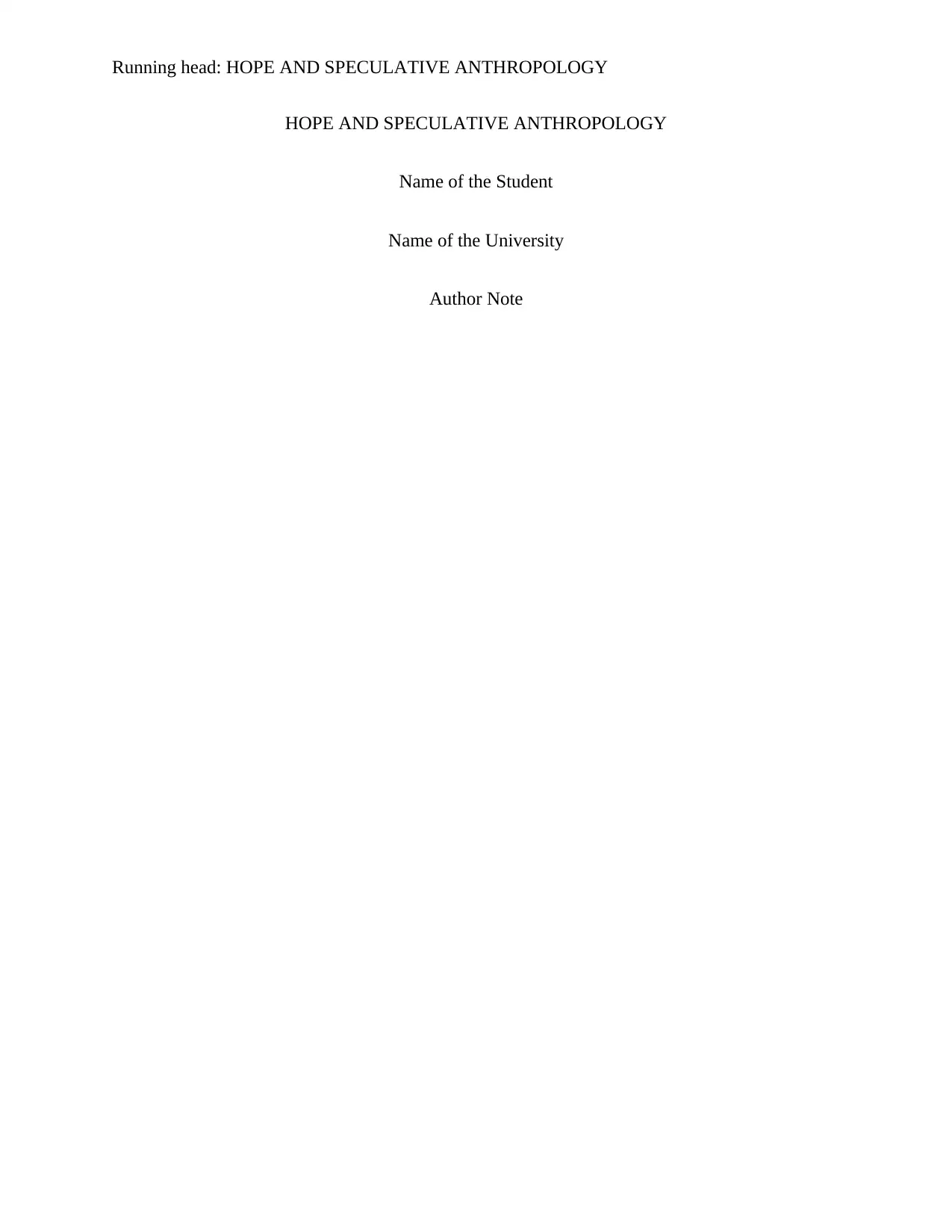
Running head: HOPE AND SPECULATIVE ANTHROPOLOGY
HOPE AND SPECULATIVE ANTHROPOLOGY
Name of the Student
Name of the University
Author Note
HOPE AND SPECULATIVE ANTHROPOLOGY
Name of the Student
Name of the University
Author Note
Paraphrase This Document
Need a fresh take? Get an instant paraphrase of this document with our AI Paraphraser
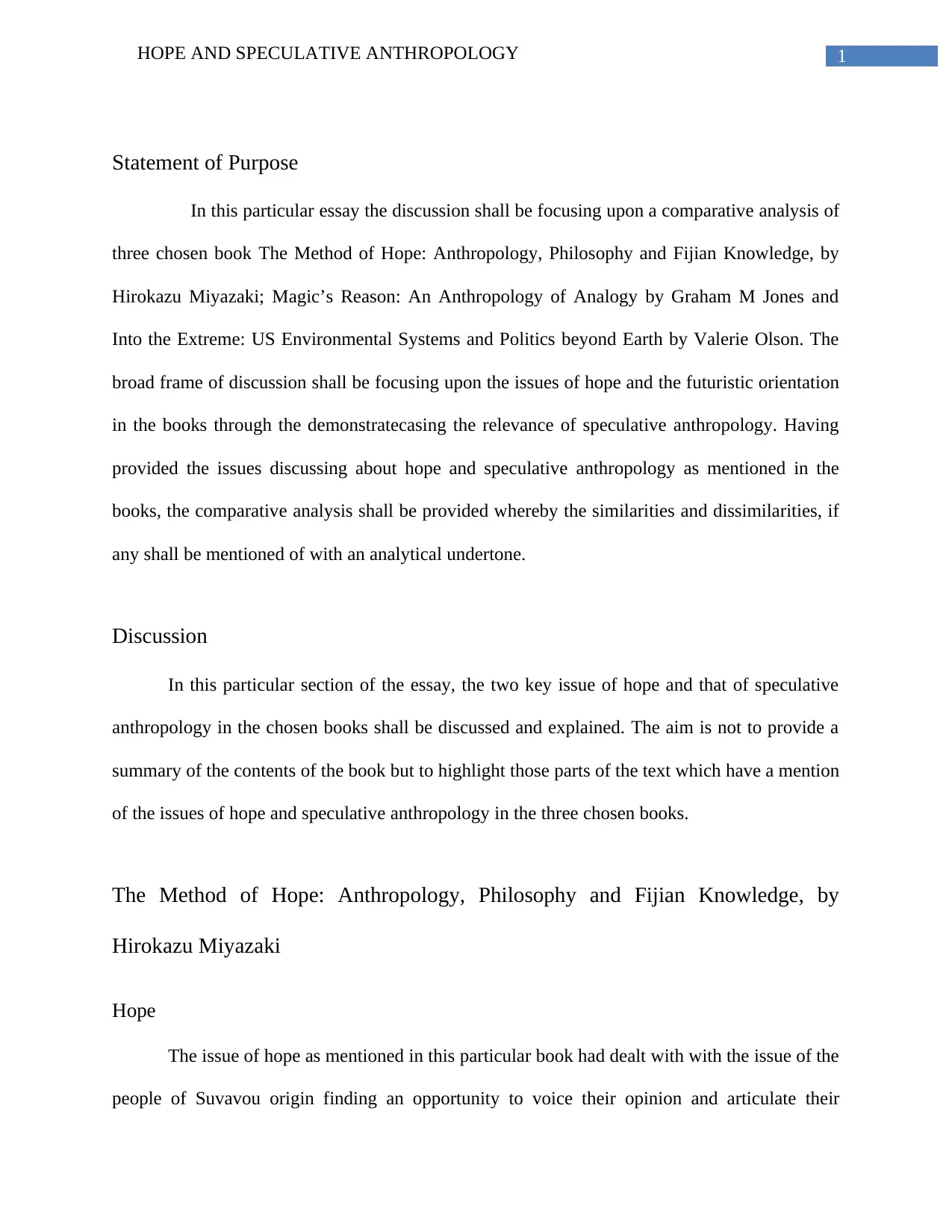
1HOPE AND SPECULATIVE ANTHROPOLOGY
Statement of Purpose
In this particular essay the discussion shall be focusing upon a comparative analysis of
three chosen book The Method of Hope: Anthropology, Philosophy and Fijian Knowledge, by
Hirokazu Miyazaki; Magic’s Reason: An Anthropology of Analogy by Graham M Jones and
Into the Extreme: US Environmental Systems and Politics beyond Earth by Valerie Olson. The
broad frame of discussion shall be focusing upon the issues of hope and the futuristic orientation
in the books through the demonstratecasing the relevance of speculative anthropology. Having
provided the issues discussing about hope and speculative anthropology as mentioned in the
books, the comparative analysis shall be provided whereby the similarities and dissimilarities, if
any shall be mentioned of with an analytical undertone.
Discussion
In this particular section of the essay, the two key issue of hope and that of speculative
anthropology in the chosen books shall be discussed and explained. The aim is not to provide a
summary of the contents of the book but to highlight those parts of the text which have a mention
of the issues of hope and speculative anthropology in the three chosen books.
The Method of Hope: Anthropology, Philosophy and Fijian Knowledge, by
Hirokazu Miyazaki
Hope
The issue of hope as mentioned in this particular book had dealt with with the issue of the
people of Suvavou origin finding an opportunity to voice their opinion and articulate their
Statement of Purpose
In this particular essay the discussion shall be focusing upon a comparative analysis of
three chosen book The Method of Hope: Anthropology, Philosophy and Fijian Knowledge, by
Hirokazu Miyazaki; Magic’s Reason: An Anthropology of Analogy by Graham M Jones and
Into the Extreme: US Environmental Systems and Politics beyond Earth by Valerie Olson. The
broad frame of discussion shall be focusing upon the issues of hope and the futuristic orientation
in the books through the demonstratecasing the relevance of speculative anthropology. Having
provided the issues discussing about hope and speculative anthropology as mentioned in the
books, the comparative analysis shall be provided whereby the similarities and dissimilarities, if
any shall be mentioned of with an analytical undertone.
Discussion
In this particular section of the essay, the two key issue of hope and that of speculative
anthropology in the chosen books shall be discussed and explained. The aim is not to provide a
summary of the contents of the book but to highlight those parts of the text which have a mention
of the issues of hope and speculative anthropology in the three chosen books.
The Method of Hope: Anthropology, Philosophy and Fijian Knowledge, by
Hirokazu Miyazaki
Hope
The issue of hope as mentioned in this particular book had dealt with with the issue of the
people of Suvavou origin finding an opportunity to voice their opinion and articulate their
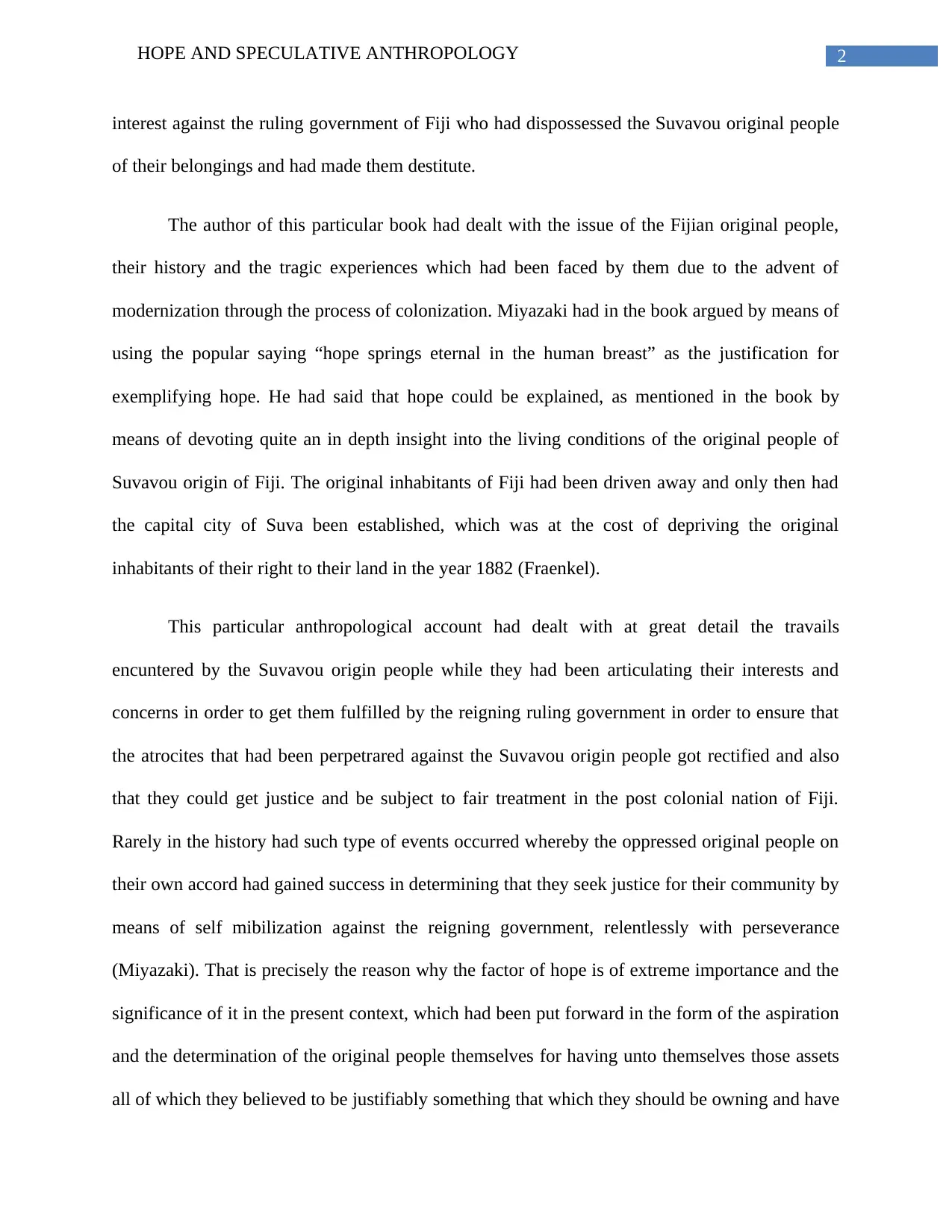
2HOPE AND SPECULATIVE ANTHROPOLOGY
interest against the ruling government of Fiji who had dispossessed the Suvavou original people
of their belongings and had made them destitute.
The author of this particular book had dealt with the issue of the Fijian original people,
their history and the tragic experiences which had been faced by them due to the advent of
modernization through the process of colonization. Miyazaki had in the book argued by means of
using the popular saying “hope springs eternal in the human breast” as the justification for
exemplifying hope. He had said that hope could be explained, as mentioned in the book by
means of devoting quite an in depth insight into the living conditions of the original people of
Suvavou origin of Fiji. The original inhabitants of Fiji had been driven away and only then had
the capital city of Suva been established, which was at the cost of depriving the original
inhabitants of their right to their land in the year 1882 (Fraenkel).
This particular anthropological account had dealt with at great detail the travails
encuntered by the Suvavou origin people while they had been articulating their interests and
concerns in order to get them fulfilled by the reigning ruling government in order to ensure that
the atrocites that had been perpetrared against the Suvavou origin people got rectified and also
that they could get justice and be subject to fair treatment in the post colonial nation of Fiji.
Rarely in the history had such type of events occurred whereby the oppressed original people on
their own accord had gained success in determining that they seek justice for their community by
means of self mibilization against the reigning government, relentlessly with perseverance
(Miyazaki). That is precisely the reason why the factor of hope is of extreme importance and the
significance of it in the present context, which had been put forward in the form of the aspiration
and the determination of the original people themselves for having unto themselves those assets
all of which they believed to be justifiably something that which they should be owning and have
interest against the ruling government of Fiji who had dispossessed the Suvavou original people
of their belongings and had made them destitute.
The author of this particular book had dealt with the issue of the Fijian original people,
their history and the tragic experiences which had been faced by them due to the advent of
modernization through the process of colonization. Miyazaki had in the book argued by means of
using the popular saying “hope springs eternal in the human breast” as the justification for
exemplifying hope. He had said that hope could be explained, as mentioned in the book by
means of devoting quite an in depth insight into the living conditions of the original people of
Suvavou origin of Fiji. The original inhabitants of Fiji had been driven away and only then had
the capital city of Suva been established, which was at the cost of depriving the original
inhabitants of their right to their land in the year 1882 (Fraenkel).
This particular anthropological account had dealt with at great detail the travails
encuntered by the Suvavou origin people while they had been articulating their interests and
concerns in order to get them fulfilled by the reigning ruling government in order to ensure that
the atrocites that had been perpetrared against the Suvavou origin people got rectified and also
that they could get justice and be subject to fair treatment in the post colonial nation of Fiji.
Rarely in the history had such type of events occurred whereby the oppressed original people on
their own accord had gained success in determining that they seek justice for their community by
means of self mibilization against the reigning government, relentlessly with perseverance
(Miyazaki). That is precisely the reason why the factor of hope is of extreme importance and the
significance of it in the present context, which had been put forward in the form of the aspiration
and the determination of the original people themselves for having unto themselves those assets
all of which they believed to be justifiably something that which they should be owning and have
⊘ This is a preview!⊘
Do you want full access?
Subscribe today to unlock all pages.

Trusted by 1+ million students worldwide
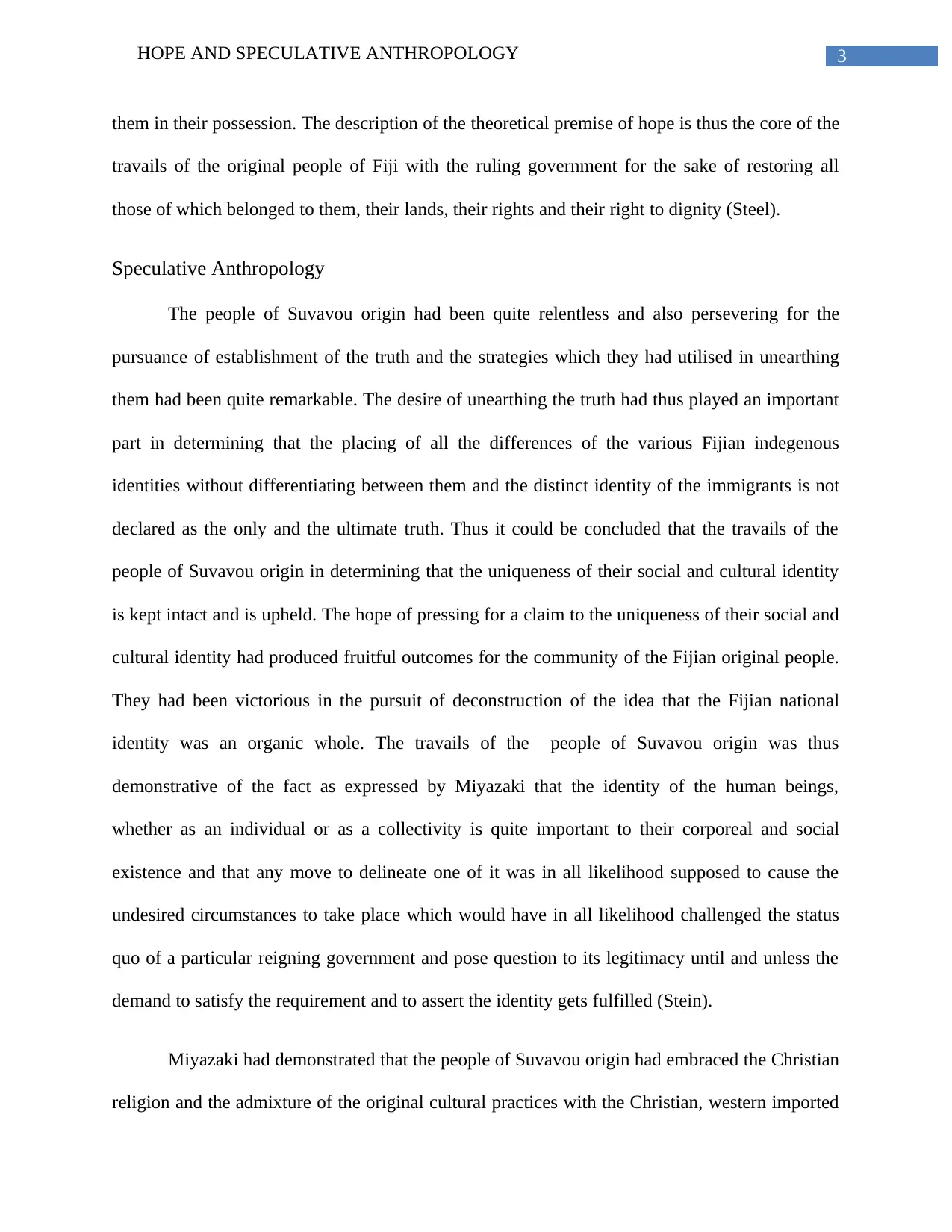
3HOPE AND SPECULATIVE ANTHROPOLOGY
them in their possession. The description of the theoretical premise of hope is thus the core of the
travails of the original people of Fiji with the ruling government for the sake of restoring all
those of which belonged to them, their lands, their rights and their right to dignity (Steel).
Speculative Anthropology
The people of Suvavou origin had been quite relentless and also persevering for the
pursuance of establishment of the truth and the strategies which they had utilised in unearthing
them had been quite remarkable. The desire of unearthing the truth had thus played an important
part in determining that the placing of all the differences of the various Fijian indegenous
identities without differentiating between them and the distinct identity of the immigrants is not
declared as the only and the ultimate truth. Thus it could be concluded that the travails of the
people of Suvavou origin in determining that the uniqueness of their social and cultural identity
is kept intact and is upheld. The hope of pressing for a claim to the uniqueness of their social and
cultural identity had produced fruitful outcomes for the community of the Fijian original people.
They had been victorious in the pursuit of deconstruction of the idea that the Fijian national
identity was an organic whole. The travails of the people of Suvavou origin was thus
demonstrative of the fact as expressed by Miyazaki that the identity of the human beings,
whether as an individual or as a collectivity is quite important to their corporeal and social
existence and that any move to delineate one of it was in all likelihood supposed to cause the
undesired circumstances to take place which would have in all likelihood challenged the status
quo of a particular reigning government and pose question to its legitimacy until and unless the
demand to satisfy the requirement and to assert the identity gets fulfilled (Stein).
Miyazaki had demonstrated that the people of Suvavou origin had embraced the Christian
religion and the admixture of the original cultural practices with the Christian, western imported
them in their possession. The description of the theoretical premise of hope is thus the core of the
travails of the original people of Fiji with the ruling government for the sake of restoring all
those of which belonged to them, their lands, their rights and their right to dignity (Steel).
Speculative Anthropology
The people of Suvavou origin had been quite relentless and also persevering for the
pursuance of establishment of the truth and the strategies which they had utilised in unearthing
them had been quite remarkable. The desire of unearthing the truth had thus played an important
part in determining that the placing of all the differences of the various Fijian indegenous
identities without differentiating between them and the distinct identity of the immigrants is not
declared as the only and the ultimate truth. Thus it could be concluded that the travails of the
people of Suvavou origin in determining that the uniqueness of their social and cultural identity
is kept intact and is upheld. The hope of pressing for a claim to the uniqueness of their social and
cultural identity had produced fruitful outcomes for the community of the Fijian original people.
They had been victorious in the pursuit of deconstruction of the idea that the Fijian national
identity was an organic whole. The travails of the people of Suvavou origin was thus
demonstrative of the fact as expressed by Miyazaki that the identity of the human beings,
whether as an individual or as a collectivity is quite important to their corporeal and social
existence and that any move to delineate one of it was in all likelihood supposed to cause the
undesired circumstances to take place which would have in all likelihood challenged the status
quo of a particular reigning government and pose question to its legitimacy until and unless the
demand to satisfy the requirement and to assert the identity gets fulfilled (Stein).
Miyazaki had demonstrated that the people of Suvavou origin had embraced the Christian
religion and the admixture of the original cultural practices with the Christian, western imported
Paraphrase This Document
Need a fresh take? Get an instant paraphrase of this document with our AI Paraphraser
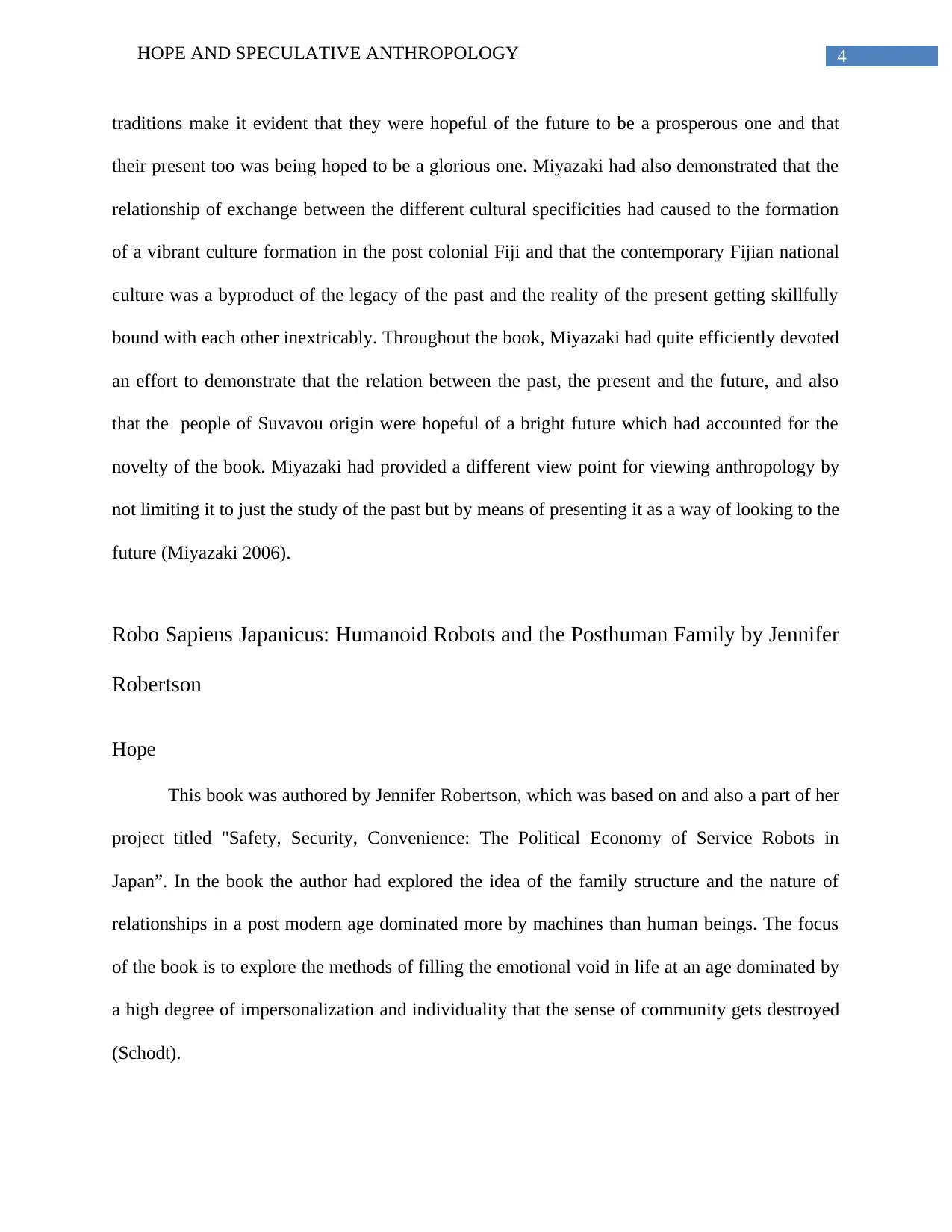
4HOPE AND SPECULATIVE ANTHROPOLOGY
traditions make it evident that they were hopeful of the future to be a prosperous one and that
their present too was being hoped to be a glorious one. Miyazaki had also demonstrated that the
relationship of exchange between the different cultural specificities had caused to the formation
of a vibrant culture formation in the post colonial Fiji and that the contemporary Fijian national
culture was a byproduct of the legacy of the past and the reality of the present getting skillfully
bound with each other inextricably. Throughout the book, Miyazaki had quite efficiently devoted
an effort to demonstrate that the relation between the past, the present and the future, and also
that the people of Suvavou origin were hopeful of a bright future which had accounted for the
novelty of the book. Miyazaki had provided a different view point for viewing anthropology by
not limiting it to just the study of the past but by means of presenting it as a way of looking to the
future (Miyazaki 2006).
Robo Sapiens Japanicus: Humanoid Robots and the Posthuman Family by Jennifer
Robertson
Hope
This book was authored by Jennifer Robertson, which was based on and also a part of her
project titled "Safety, Security, Convenience: The Political Economy of Service Robots in
Japan”. In the book the author had explored the idea of the family structure and the nature of
relationships in a post modern age dominated more by machines than human beings. The focus
of the book is to explore the methods of filling the emotional void in life at an age dominated by
a high degree of impersonalization and individuality that the sense of community gets destroyed
(Schodt).
traditions make it evident that they were hopeful of the future to be a prosperous one and that
their present too was being hoped to be a glorious one. Miyazaki had also demonstrated that the
relationship of exchange between the different cultural specificities had caused to the formation
of a vibrant culture formation in the post colonial Fiji and that the contemporary Fijian national
culture was a byproduct of the legacy of the past and the reality of the present getting skillfully
bound with each other inextricably. Throughout the book, Miyazaki had quite efficiently devoted
an effort to demonstrate that the relation between the past, the present and the future, and also
that the people of Suvavou origin were hopeful of a bright future which had accounted for the
novelty of the book. Miyazaki had provided a different view point for viewing anthropology by
not limiting it to just the study of the past but by means of presenting it as a way of looking to the
future (Miyazaki 2006).
Robo Sapiens Japanicus: Humanoid Robots and the Posthuman Family by Jennifer
Robertson
Hope
This book was authored by Jennifer Robertson, which was based on and also a part of her
project titled "Safety, Security, Convenience: The Political Economy of Service Robots in
Japan”. In the book the author had explored the idea of the family structure and the nature of
relationships in a post modern age dominated more by machines than human beings. The focus
of the book is to explore the methods of filling the emotional void in life at an age dominated by
a high degree of impersonalization and individuality that the sense of community gets destroyed
(Schodt).
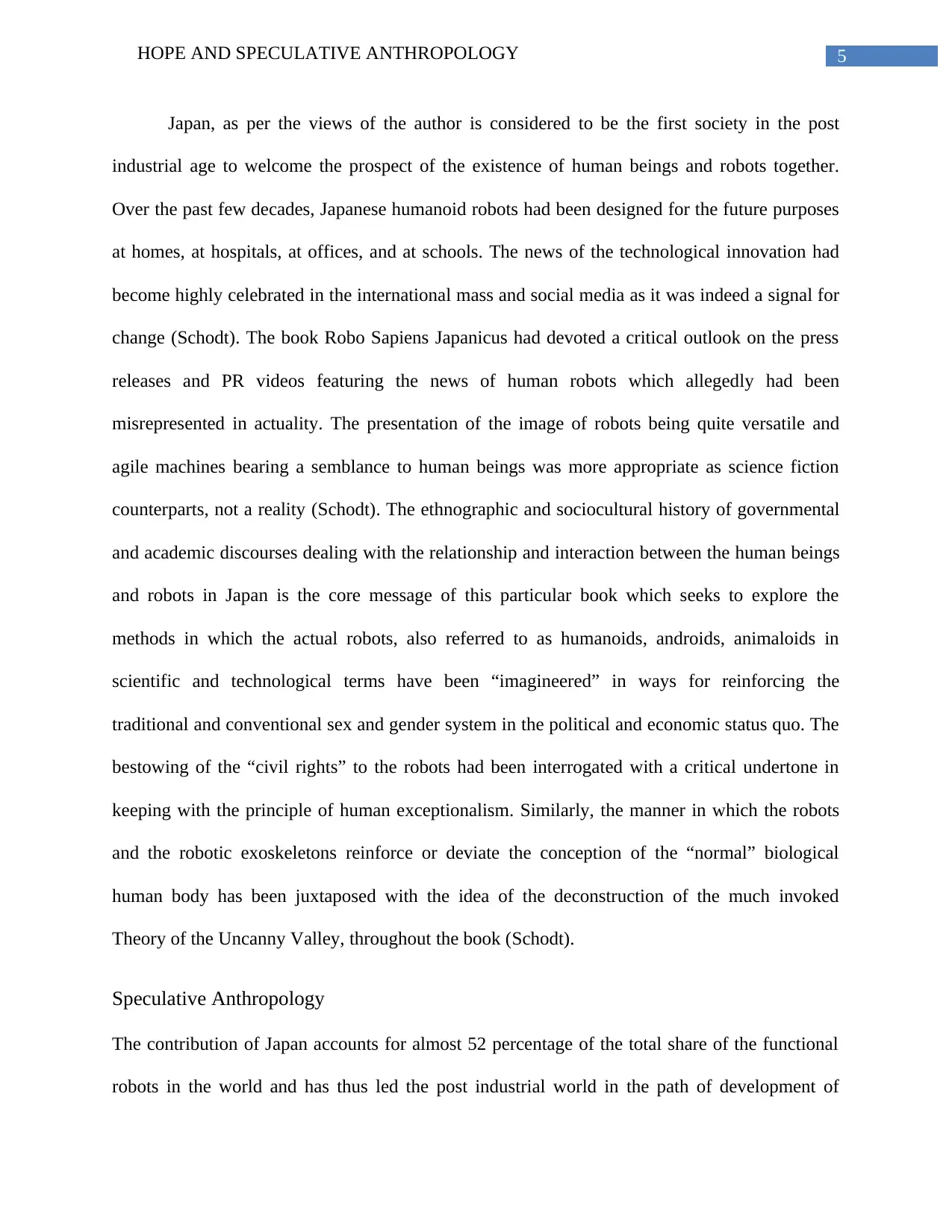
5HOPE AND SPECULATIVE ANTHROPOLOGY
Japan, as per the views of the author is considered to be the first society in the post
industrial age to welcome the prospect of the existence of human beings and robots together.
Over the past few decades, Japanese humanoid robots had been designed for the future purposes
at homes, at hospitals, at offices, and at schools. The news of the technological innovation had
become highly celebrated in the international mass and social media as it was indeed a signal for
change (Schodt). The book Robo Sapiens Japanicus had devoted a critical outlook on the press
releases and PR videos featuring the news of human robots which allegedly had been
misrepresented in actuality. The presentation of the image of robots being quite versatile and
agile machines bearing a semblance to human beings was more appropriate as science fiction
counterparts, not a reality (Schodt). The ethnographic and sociocultural history of governmental
and academic discourses dealing with the relationship and interaction between the human beings
and robots in Japan is the core message of this particular book which seeks to explore the
methods in which the actual robots, also referred to as humanoids, androids, animaloids in
scientific and technological terms have been “imagineered” in ways for reinforcing the
traditional and conventional sex and gender system in the political and economic status quo. The
bestowing of the “civil rights” to the robots had been interrogated with a critical undertone in
keeping with the principle of human exceptionalism. Similarly, the manner in which the robots
and the robotic exoskeletons reinforce or deviate the conception of the “normal” biological
human body has been juxtaposed with the idea of the deconstruction of the much invoked
Theory of the Uncanny Valley, throughout the book (Schodt).
Speculative Anthropology
The contribution of Japan accounts for almost 52 percentage of the total share of the functional
robots in the world and has thus led the post industrial world in the path of development of
Japan, as per the views of the author is considered to be the first society in the post
industrial age to welcome the prospect of the existence of human beings and robots together.
Over the past few decades, Japanese humanoid robots had been designed for the future purposes
at homes, at hospitals, at offices, and at schools. The news of the technological innovation had
become highly celebrated in the international mass and social media as it was indeed a signal for
change (Schodt). The book Robo Sapiens Japanicus had devoted a critical outlook on the press
releases and PR videos featuring the news of human robots which allegedly had been
misrepresented in actuality. The presentation of the image of robots being quite versatile and
agile machines bearing a semblance to human beings was more appropriate as science fiction
counterparts, not a reality (Schodt). The ethnographic and sociocultural history of governmental
and academic discourses dealing with the relationship and interaction between the human beings
and robots in Japan is the core message of this particular book which seeks to explore the
methods in which the actual robots, also referred to as humanoids, androids, animaloids in
scientific and technological terms have been “imagineered” in ways for reinforcing the
traditional and conventional sex and gender system in the political and economic status quo. The
bestowing of the “civil rights” to the robots had been interrogated with a critical undertone in
keeping with the principle of human exceptionalism. Similarly, the manner in which the robots
and the robotic exoskeletons reinforce or deviate the conception of the “normal” biological
human body has been juxtaposed with the idea of the deconstruction of the much invoked
Theory of the Uncanny Valley, throughout the book (Schodt).
Speculative Anthropology
The contribution of Japan accounts for almost 52 percentage of the total share of the functional
robots in the world and has thus led the post industrial world in the path of development of
⊘ This is a preview!⊘
Do you want full access?
Subscribe today to unlock all pages.

Trusted by 1+ million students worldwide
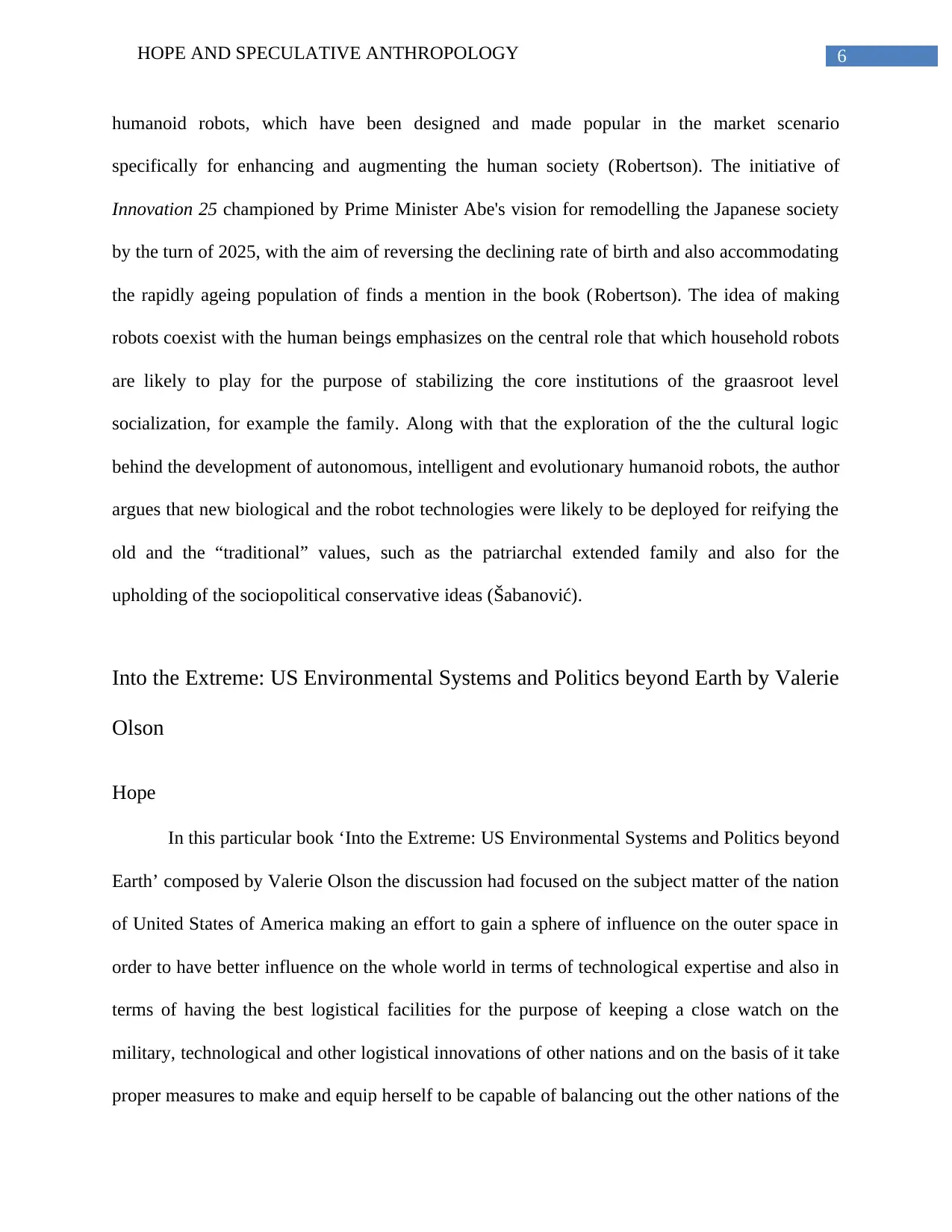
6HOPE AND SPECULATIVE ANTHROPOLOGY
humanoid robots, which have been designed and made popular in the market scenario
specifically for enhancing and augmenting the human society (Robertson). The initiative of
Innovation 25 championed by Prime Minister Abe's vision for remodelling the Japanese society
by the turn of 2025, with the aim of reversing the declining rate of birth and also accommodating
the rapidly ageing population of finds a mention in the book (Robertson). The idea of making
robots coexist with the human beings emphasizes on the central role that which household robots
are likely to play for the purpose of stabilizing the core institutions of the graasroot level
socialization, for example the family. Along with that the exploration of the the cultural logic
behind the development of autonomous, intelligent and evolutionary humanoid robots, the author
argues that new biological and the robot technologies were likely to be deployed for reifying the
old and the “traditional” values, such as the patriarchal extended family and also for the
upholding of the sociopolitical conservative ideas (Šabanović).
Into the Extreme: US Environmental Systems and Politics beyond Earth by Valerie
Olson
Hope
In this particular book ‘Into the Extreme: US Environmental Systems and Politics beyond
Earth’ composed by Valerie Olson the discussion had focused on the subject matter of the nation
of United States of America making an effort to gain a sphere of influence on the outer space in
order to have better influence on the whole world in terms of technological expertise and also in
terms of having the best logistical facilities for the purpose of keeping a close watch on the
military, technological and other logistical innovations of other nations and on the basis of it take
proper measures to make and equip herself to be capable of balancing out the other nations of the
humanoid robots, which have been designed and made popular in the market scenario
specifically for enhancing and augmenting the human society (Robertson). The initiative of
Innovation 25 championed by Prime Minister Abe's vision for remodelling the Japanese society
by the turn of 2025, with the aim of reversing the declining rate of birth and also accommodating
the rapidly ageing population of finds a mention in the book (Robertson). The idea of making
robots coexist with the human beings emphasizes on the central role that which household robots
are likely to play for the purpose of stabilizing the core institutions of the graasroot level
socialization, for example the family. Along with that the exploration of the the cultural logic
behind the development of autonomous, intelligent and evolutionary humanoid robots, the author
argues that new biological and the robot technologies were likely to be deployed for reifying the
old and the “traditional” values, such as the patriarchal extended family and also for the
upholding of the sociopolitical conservative ideas (Šabanović).
Into the Extreme: US Environmental Systems and Politics beyond Earth by Valerie
Olson
Hope
In this particular book ‘Into the Extreme: US Environmental Systems and Politics beyond
Earth’ composed by Valerie Olson the discussion had focused on the subject matter of the nation
of United States of America making an effort to gain a sphere of influence on the outer space in
order to have better influence on the whole world in terms of technological expertise and also in
terms of having the best logistical facilities for the purpose of keeping a close watch on the
military, technological and other logistical innovations of other nations and on the basis of it take
proper measures to make and equip herself to be capable of balancing out the other nations of the
Paraphrase This Document
Need a fresh take? Get an instant paraphrase of this document with our AI Paraphraser
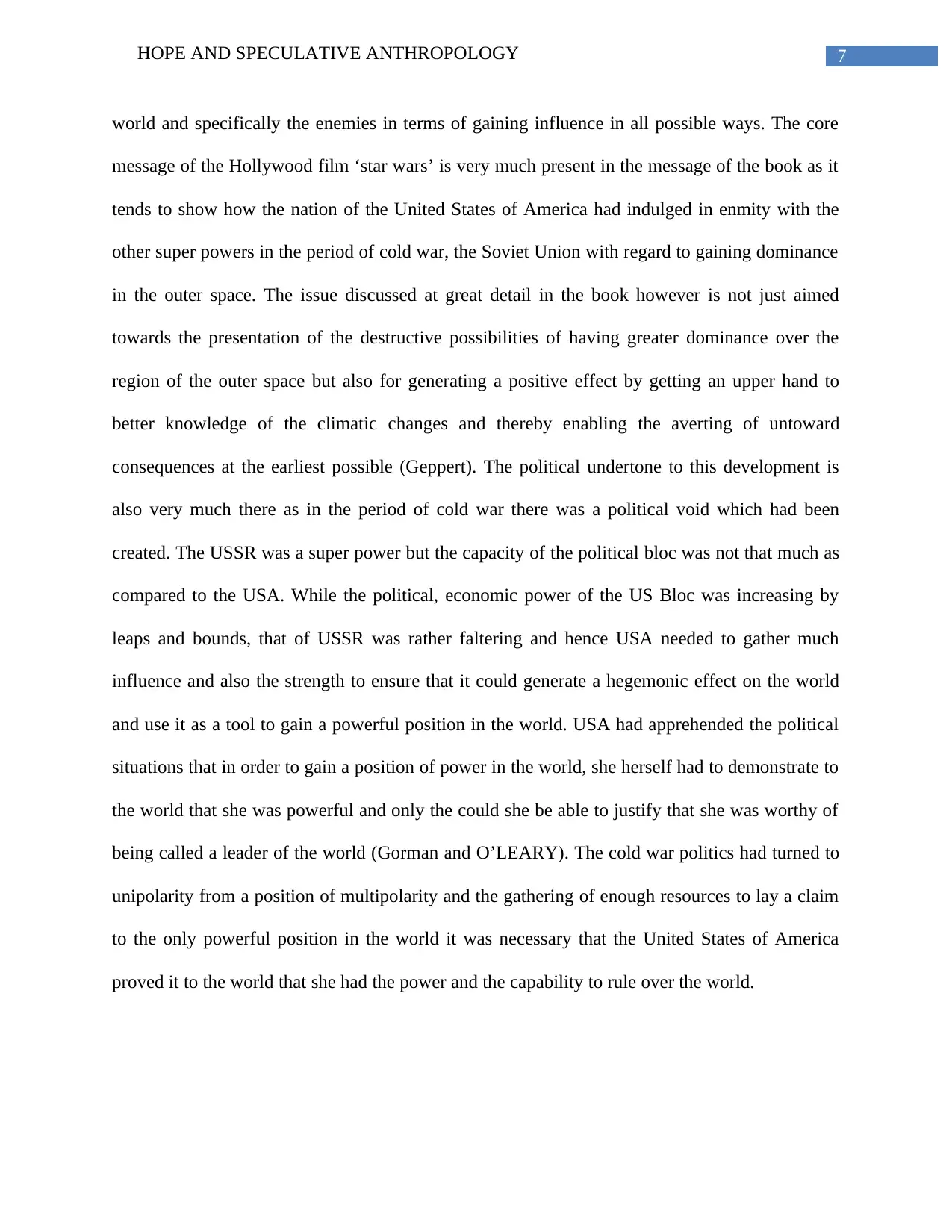
7HOPE AND SPECULATIVE ANTHROPOLOGY
world and specifically the enemies in terms of gaining influence in all possible ways. The core
message of the Hollywood film ‘star wars’ is very much present in the message of the book as it
tends to show how the nation of the United States of America had indulged in enmity with the
other super powers in the period of cold war, the Soviet Union with regard to gaining dominance
in the outer space. The issue discussed at great detail in the book however is not just aimed
towards the presentation of the destructive possibilities of having greater dominance over the
region of the outer space but also for generating a positive effect by getting an upper hand to
better knowledge of the climatic changes and thereby enabling the averting of untoward
consequences at the earliest possible (Geppert). The political undertone to this development is
also very much there as in the period of cold war there was a political void which had been
created. The USSR was a super power but the capacity of the political bloc was not that much as
compared to the USA. While the political, economic power of the US Bloc was increasing by
leaps and bounds, that of USSR was rather faltering and hence USA needed to gather much
influence and also the strength to ensure that it could generate a hegemonic effect on the world
and use it as a tool to gain a powerful position in the world. USA had apprehended the political
situations that in order to gain a position of power in the world, she herself had to demonstrate to
the world that she was powerful and only the could she be able to justify that she was worthy of
being called a leader of the world (Gorman and O’LEARY). The cold war politics had turned to
unipolarity from a position of multipolarity and the gathering of enough resources to lay a claim
to the only powerful position in the world it was necessary that the United States of America
proved it to the world that she had the power and the capability to rule over the world.
world and specifically the enemies in terms of gaining influence in all possible ways. The core
message of the Hollywood film ‘star wars’ is very much present in the message of the book as it
tends to show how the nation of the United States of America had indulged in enmity with the
other super powers in the period of cold war, the Soviet Union with regard to gaining dominance
in the outer space. The issue discussed at great detail in the book however is not just aimed
towards the presentation of the destructive possibilities of having greater dominance over the
region of the outer space but also for generating a positive effect by getting an upper hand to
better knowledge of the climatic changes and thereby enabling the averting of untoward
consequences at the earliest possible (Geppert). The political undertone to this development is
also very much there as in the period of cold war there was a political void which had been
created. The USSR was a super power but the capacity of the political bloc was not that much as
compared to the USA. While the political, economic power of the US Bloc was increasing by
leaps and bounds, that of USSR was rather faltering and hence USA needed to gather much
influence and also the strength to ensure that it could generate a hegemonic effect on the world
and use it as a tool to gain a powerful position in the world. USA had apprehended the political
situations that in order to gain a position of power in the world, she herself had to demonstrate to
the world that she was powerful and only the could she be able to justify that she was worthy of
being called a leader of the world (Gorman and O’LEARY). The cold war politics had turned to
unipolarity from a position of multipolarity and the gathering of enough resources to lay a claim
to the only powerful position in the world it was necessary that the United States of America
proved it to the world that she had the power and the capability to rule over the world.
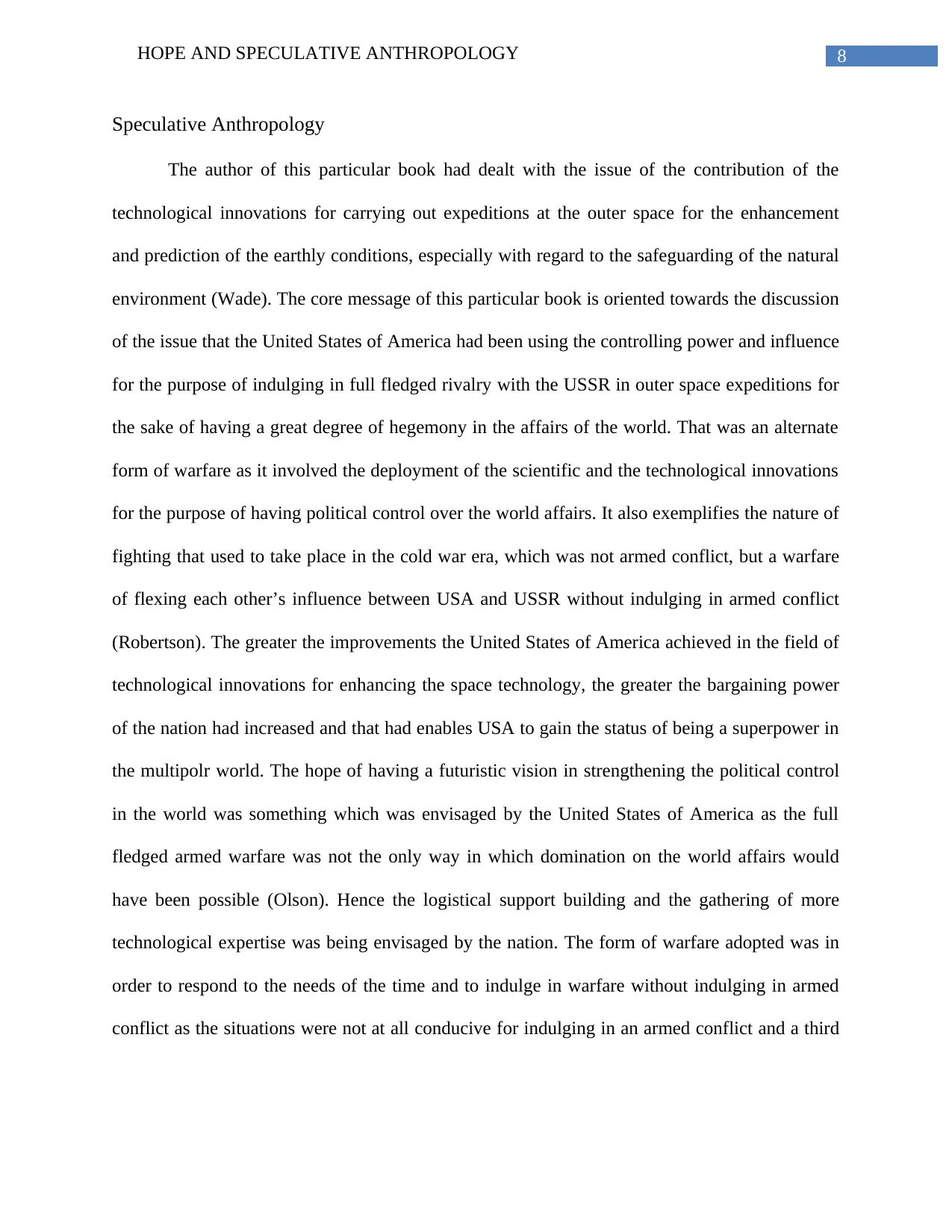
8HOPE AND SPECULATIVE ANTHROPOLOGY
Speculative Anthropology
The author of this particular book had dealt with the issue of the contribution of the
technological innovations for carrying out expeditions at the outer space for the enhancement
and prediction of the earthly conditions, especially with regard to the safeguarding of the natural
environment (Wade). The core message of this particular book is oriented towards the discussion
of the issue that the United States of America had been using the controlling power and influence
for the purpose of indulging in full fledged rivalry with the USSR in outer space expeditions for
the sake of having a great degree of hegemony in the affairs of the world. That was an alternate
form of warfare as it involved the deployment of the scientific and the technological innovations
for the purpose of having political control over the world affairs. It also exemplifies the nature of
fighting that used to take place in the cold war era, which was not armed conflict, but a warfare
of flexing each other’s influence between USA and USSR without indulging in armed conflict
(Robertson). The greater the improvements the United States of America achieved in the field of
technological innovations for enhancing the space technology, the greater the bargaining power
of the nation had increased and that had enables USA to gain the status of being a superpower in
the multipolr world. The hope of having a futuristic vision in strengthening the political control
in the world was something which was envisaged by the United States of America as the full
fledged armed warfare was not the only way in which domination on the world affairs would
have been possible (Olson). Hence the logistical support building and the gathering of more
technological expertise was being envisaged by the nation. The form of warfare adopted was in
order to respond to the needs of the time and to indulge in warfare without indulging in armed
conflict as the situations were not at all conducive for indulging in an armed conflict and a third
Speculative Anthropology
The author of this particular book had dealt with the issue of the contribution of the
technological innovations for carrying out expeditions at the outer space for the enhancement
and prediction of the earthly conditions, especially with regard to the safeguarding of the natural
environment (Wade). The core message of this particular book is oriented towards the discussion
of the issue that the United States of America had been using the controlling power and influence
for the purpose of indulging in full fledged rivalry with the USSR in outer space expeditions for
the sake of having a great degree of hegemony in the affairs of the world. That was an alternate
form of warfare as it involved the deployment of the scientific and the technological innovations
for the purpose of having political control over the world affairs. It also exemplifies the nature of
fighting that used to take place in the cold war era, which was not armed conflict, but a warfare
of flexing each other’s influence between USA and USSR without indulging in armed conflict
(Robertson). The greater the improvements the United States of America achieved in the field of
technological innovations for enhancing the space technology, the greater the bargaining power
of the nation had increased and that had enables USA to gain the status of being a superpower in
the multipolr world. The hope of having a futuristic vision in strengthening the political control
in the world was something which was envisaged by the United States of America as the full
fledged armed warfare was not the only way in which domination on the world affairs would
have been possible (Olson). Hence the logistical support building and the gathering of more
technological expertise was being envisaged by the nation. The form of warfare adopted was in
order to respond to the needs of the time and to indulge in warfare without indulging in armed
conflict as the situations were not at all conducive for indulging in an armed conflict and a third
⊘ This is a preview!⊘
Do you want full access?
Subscribe today to unlock all pages.

Trusted by 1+ million students worldwide
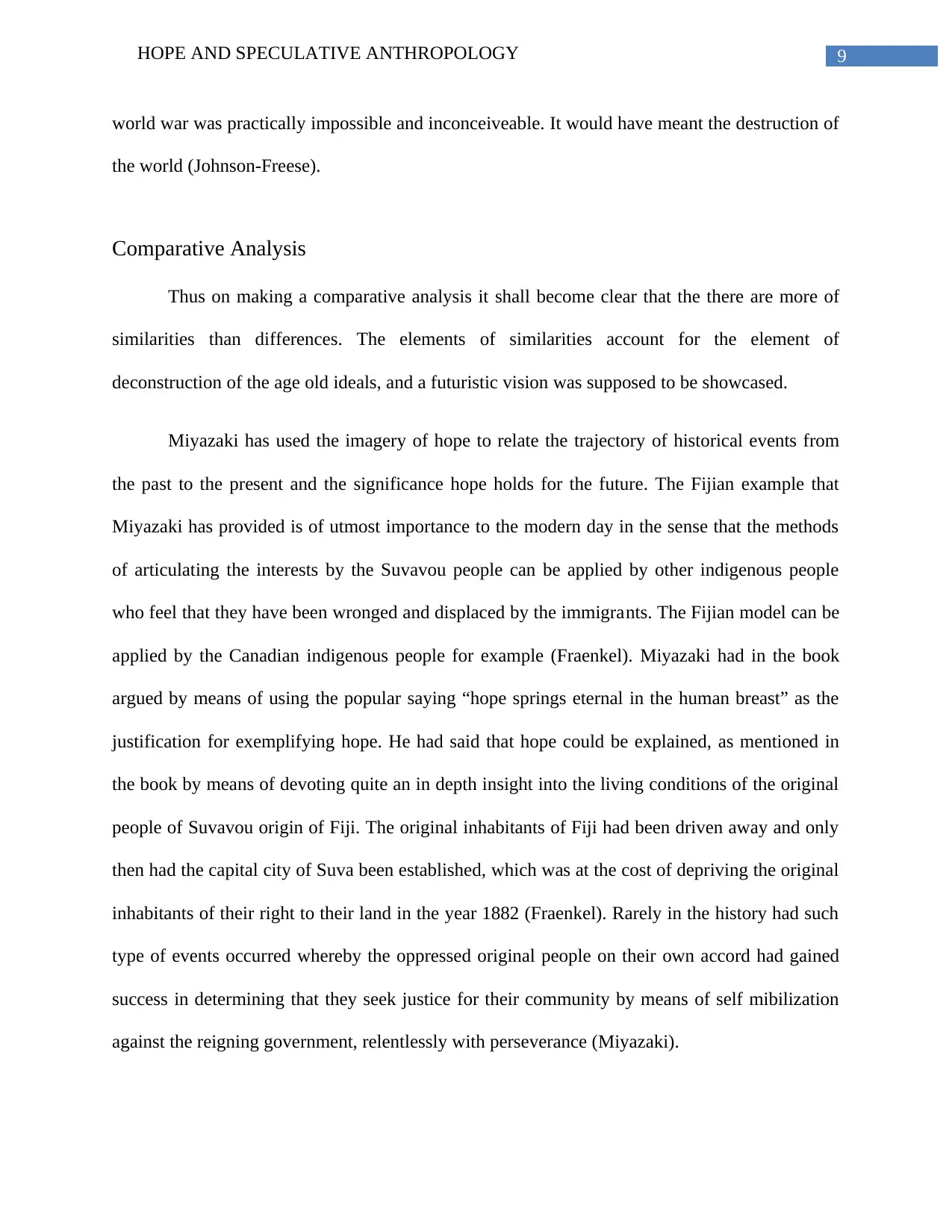
9HOPE AND SPECULATIVE ANTHROPOLOGY
world war was practically impossible and inconceiveable. It would have meant the destruction of
the world (Johnson-Freese).
Comparative Analysis
Thus on making a comparative analysis it shall become clear that the there are more of
similarities than differences. The elements of similarities account for the element of
deconstruction of the age old ideals, and a futuristic vision was supposed to be showcased.
Miyazaki has used the imagery of hope to relate the trajectory of historical events from
the past to the present and the significance hope holds for the future. The Fijian example that
Miyazaki has provided is of utmost importance to the modern day in the sense that the methods
of articulating the interests by the Suvavou people can be applied by other indigenous people
who feel that they have been wronged and displaced by the immigrants. The Fijian model can be
applied by the Canadian indigenous people for example (Fraenkel). Miyazaki had in the book
argued by means of using the popular saying “hope springs eternal in the human breast” as the
justification for exemplifying hope. He had said that hope could be explained, as mentioned in
the book by means of devoting quite an in depth insight into the living conditions of the original
people of Suvavou origin of Fiji. The original inhabitants of Fiji had been driven away and only
then had the capital city of Suva been established, which was at the cost of depriving the original
inhabitants of their right to their land in the year 1882 (Fraenkel). Rarely in the history had such
type of events occurred whereby the oppressed original people on their own accord had gained
success in determining that they seek justice for their community by means of self mibilization
against the reigning government, relentlessly with perseverance (Miyazaki).
world war was practically impossible and inconceiveable. It would have meant the destruction of
the world (Johnson-Freese).
Comparative Analysis
Thus on making a comparative analysis it shall become clear that the there are more of
similarities than differences. The elements of similarities account for the element of
deconstruction of the age old ideals, and a futuristic vision was supposed to be showcased.
Miyazaki has used the imagery of hope to relate the trajectory of historical events from
the past to the present and the significance hope holds for the future. The Fijian example that
Miyazaki has provided is of utmost importance to the modern day in the sense that the methods
of articulating the interests by the Suvavou people can be applied by other indigenous people
who feel that they have been wronged and displaced by the immigrants. The Fijian model can be
applied by the Canadian indigenous people for example (Fraenkel). Miyazaki had in the book
argued by means of using the popular saying “hope springs eternal in the human breast” as the
justification for exemplifying hope. He had said that hope could be explained, as mentioned in
the book by means of devoting quite an in depth insight into the living conditions of the original
people of Suvavou origin of Fiji. The original inhabitants of Fiji had been driven away and only
then had the capital city of Suva been established, which was at the cost of depriving the original
inhabitants of their right to their land in the year 1882 (Fraenkel). Rarely in the history had such
type of events occurred whereby the oppressed original people on their own accord had gained
success in determining that they seek justice for their community by means of self mibilization
against the reigning government, relentlessly with perseverance (Miyazaki).
Paraphrase This Document
Need a fresh take? Get an instant paraphrase of this document with our AI Paraphraser
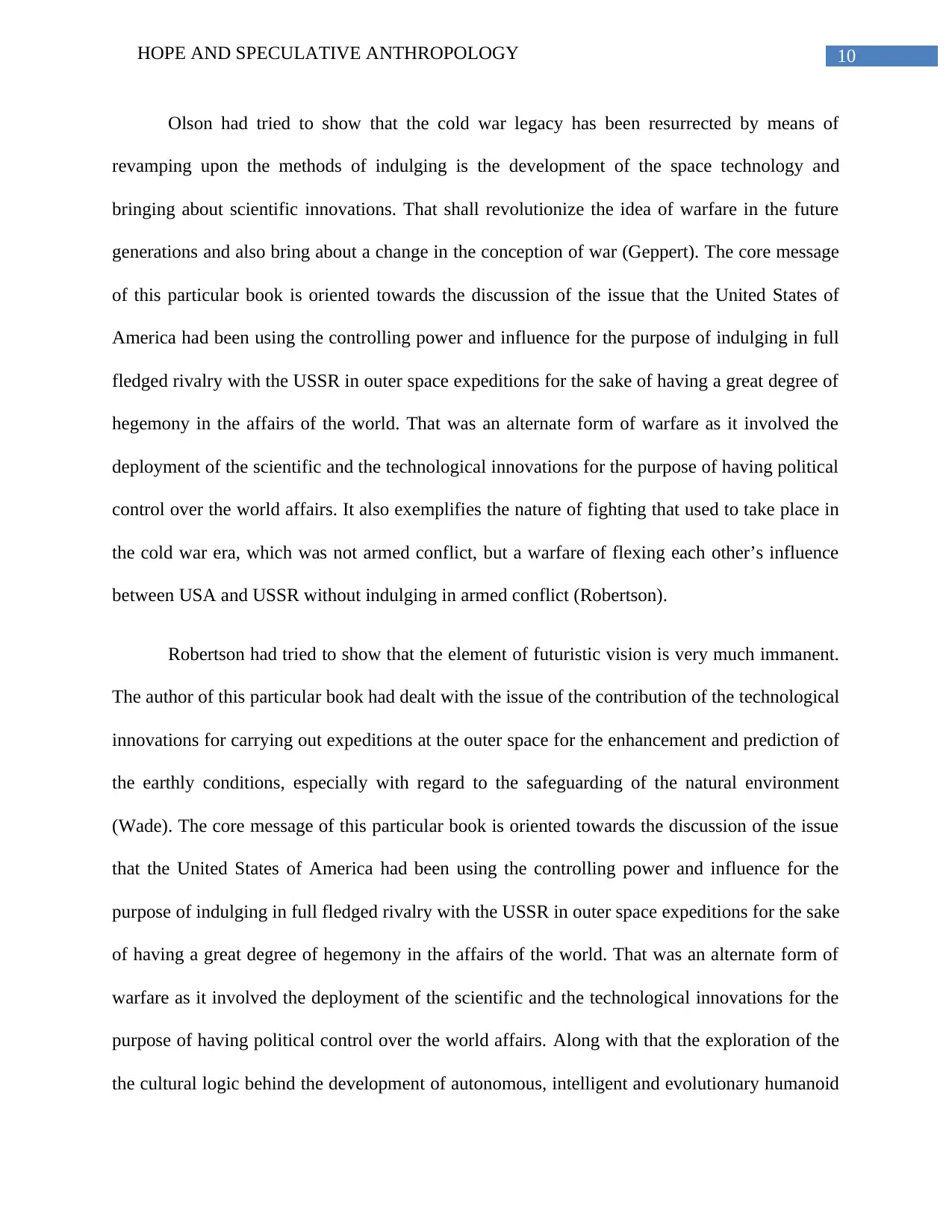
10HOPE AND SPECULATIVE ANTHROPOLOGY
Olson had tried to show that the cold war legacy has been resurrected by means of
revamping upon the methods of indulging is the development of the space technology and
bringing about scientific innovations. That shall revolutionize the idea of warfare in the future
generations and also bring about a change in the conception of war (Geppert). The core message
of this particular book is oriented towards the discussion of the issue that the United States of
America had been using the controlling power and influence for the purpose of indulging in full
fledged rivalry with the USSR in outer space expeditions for the sake of having a great degree of
hegemony in the affairs of the world. That was an alternate form of warfare as it involved the
deployment of the scientific and the technological innovations for the purpose of having political
control over the world affairs. It also exemplifies the nature of fighting that used to take place in
the cold war era, which was not armed conflict, but a warfare of flexing each other’s influence
between USA and USSR without indulging in armed conflict (Robertson).
Robertson had tried to show that the element of futuristic vision is very much immanent.
The author of this particular book had dealt with the issue of the contribution of the technological
innovations for carrying out expeditions at the outer space for the enhancement and prediction of
the earthly conditions, especially with regard to the safeguarding of the natural environment
(Wade). The core message of this particular book is oriented towards the discussion of the issue
that the United States of America had been using the controlling power and influence for the
purpose of indulging in full fledged rivalry with the USSR in outer space expeditions for the sake
of having a great degree of hegemony in the affairs of the world. That was an alternate form of
warfare as it involved the deployment of the scientific and the technological innovations for the
purpose of having political control over the world affairs. Along with that the exploration of the
the cultural logic behind the development of autonomous, intelligent and evolutionary humanoid
Olson had tried to show that the cold war legacy has been resurrected by means of
revamping upon the methods of indulging is the development of the space technology and
bringing about scientific innovations. That shall revolutionize the idea of warfare in the future
generations and also bring about a change in the conception of war (Geppert). The core message
of this particular book is oriented towards the discussion of the issue that the United States of
America had been using the controlling power and influence for the purpose of indulging in full
fledged rivalry with the USSR in outer space expeditions for the sake of having a great degree of
hegemony in the affairs of the world. That was an alternate form of warfare as it involved the
deployment of the scientific and the technological innovations for the purpose of having political
control over the world affairs. It also exemplifies the nature of fighting that used to take place in
the cold war era, which was not armed conflict, but a warfare of flexing each other’s influence
between USA and USSR without indulging in armed conflict (Robertson).
Robertson had tried to show that the element of futuristic vision is very much immanent.
The author of this particular book had dealt with the issue of the contribution of the technological
innovations for carrying out expeditions at the outer space for the enhancement and prediction of
the earthly conditions, especially with regard to the safeguarding of the natural environment
(Wade). The core message of this particular book is oriented towards the discussion of the issue
that the United States of America had been using the controlling power and influence for the
purpose of indulging in full fledged rivalry with the USSR in outer space expeditions for the sake
of having a great degree of hegemony in the affairs of the world. That was an alternate form of
warfare as it involved the deployment of the scientific and the technological innovations for the
purpose of having political control over the world affairs. Along with that the exploration of the
the cultural logic behind the development of autonomous, intelligent and evolutionary humanoid
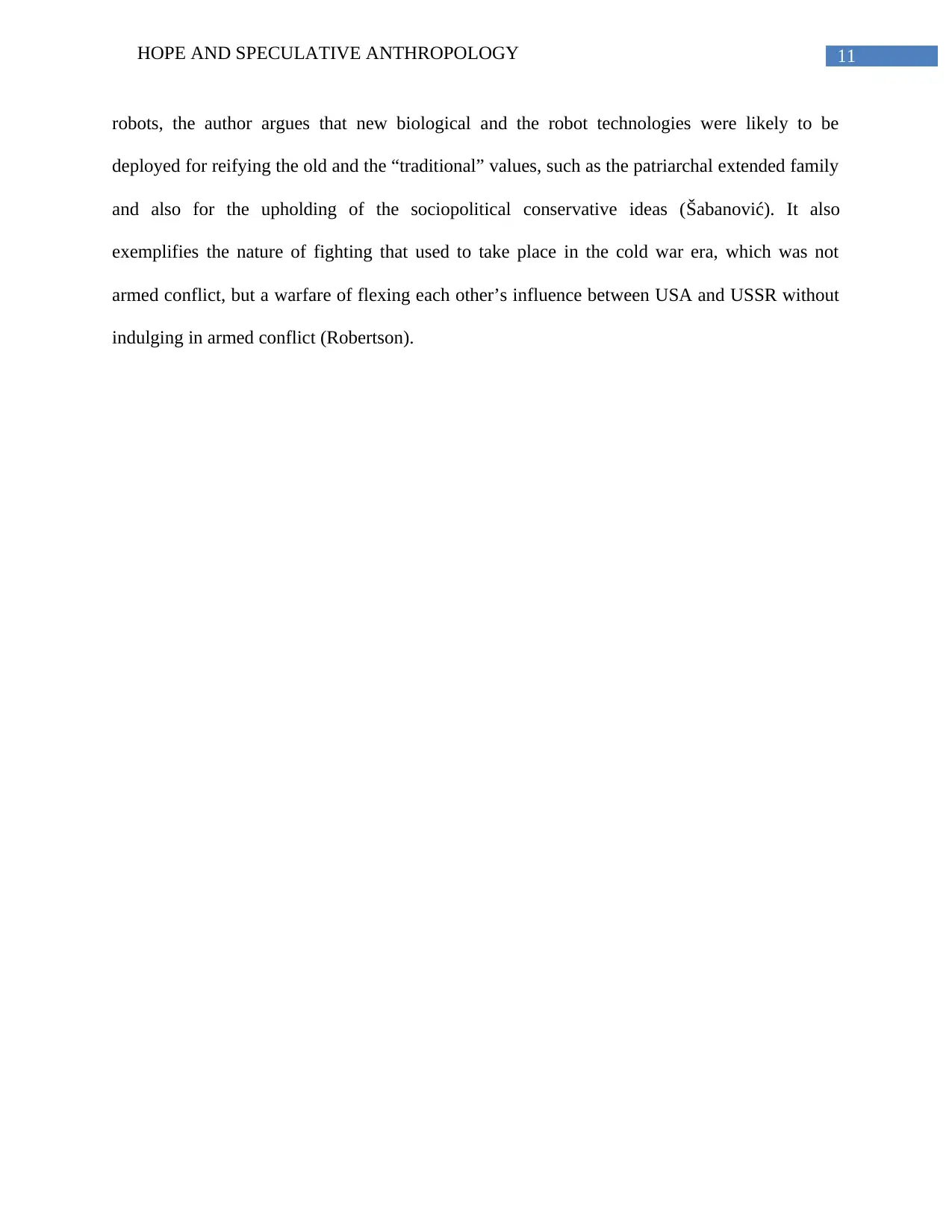
11HOPE AND SPECULATIVE ANTHROPOLOGY
robots, the author argues that new biological and the robot technologies were likely to be
deployed for reifying the old and the “traditional” values, such as the patriarchal extended family
and also for the upholding of the sociopolitical conservative ideas (Šabanović). It also
exemplifies the nature of fighting that used to take place in the cold war era, which was not
armed conflict, but a warfare of flexing each other’s influence between USA and USSR without
indulging in armed conflict (Robertson).
robots, the author argues that new biological and the robot technologies were likely to be
deployed for reifying the old and the “traditional” values, such as the patriarchal extended family
and also for the upholding of the sociopolitical conservative ideas (Šabanović). It also
exemplifies the nature of fighting that used to take place in the cold war era, which was not
armed conflict, but a warfare of flexing each other’s influence between USA and USSR without
indulging in armed conflict (Robertson).
⊘ This is a preview!⊘
Do you want full access?
Subscribe today to unlock all pages.

Trusted by 1+ million students worldwide
1 out of 15
Related Documents
Your All-in-One AI-Powered Toolkit for Academic Success.
+13062052269
info@desklib.com
Available 24*7 on WhatsApp / Email
![[object Object]](/_next/static/media/star-bottom.7253800d.svg)
Unlock your academic potential
Copyright © 2020–2026 A2Z Services. All Rights Reserved. Developed and managed by ZUCOL.




